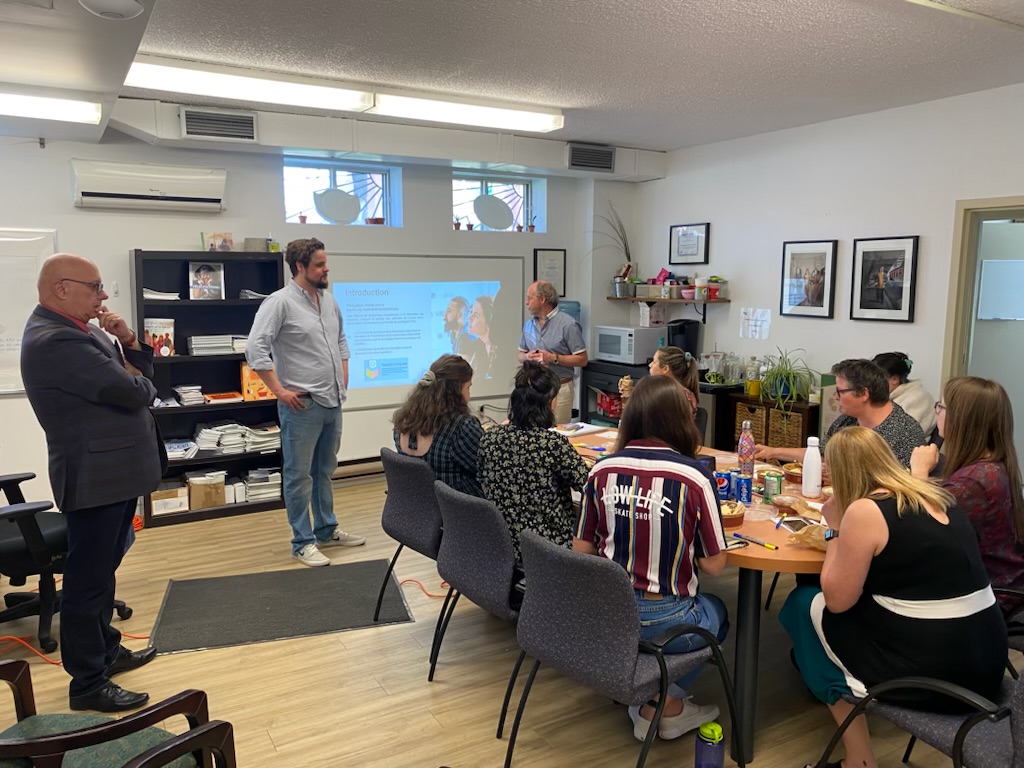Financial literacy as an antidote to stress
Why It Matters
Money is the most significant source of stress for many Canadians—more than work, personal health and relationships. Most Canadians cannot access an employer retirement plan, making retirement planning their responsibility. However, financial literacy can help reduce this tension for many Canadian households, increasing their wellbeing.

Last November, the team from Deuil Jeunesse, a Quebec City charity, sat together to learn how to budget for their personal lives.
This 19-employee organization offers training to its workforce four times a year, focused on the non-profit’s mission of supporting the public in the face of sudden death, accident, suicide, homicide, serious illness, medical aid in dying, perinatal bereavement, and pet bereavement.
However, founder Josée Masson recently expanded the training reach to encompass personal finances.
“Our employees deal with human suffering daily,” said Masson, adding they see first-hand the consequences on a partner or a family when someone dies without their finances in order.
“When you can’t pay any more for your child’s piano lessons or hockey club, their grief overshadows everything else,” said Masson.
“And if you have to move because you can’t afford the rent or mortgage, it adds another layer to the family’s grief.”
Deuil Jeunesse’s training aims to help their staff gain professional knowledge, detract from suffering and cultivate wellness.
“I want to provide my team time to reflect upon their lives,” said Masson.
The omnipresence of financial stress
Deuil Jeunesse turned to Fonds de Solidarité FTQ, a workers’ fund associated with the trade union FTQ, for their budget training.
Fonds has provided basic economic training to its members to demystify economic cycles and company workings so workers understand their contribution to productivity and the employer’s sustainability, said Jeannot Bradette, senior manager of the Economic Training Centre of le Fonds de Solidarité FTQ.
“The ultimate goal is for Quebec workers in all sectors to become socio-economic players in their own right. It’s a question of empowerment, of getting control over your financial life,” said Bradette.

In April 2022, Fonds added personal finance sessions to their offerings, and more than 100 organizations have taken advantage, from dental clinics to factories to garages to non-profits.
Participants are invited to share their personal stories with the group during sessions.
“Theory courses would not be relevant with adults,” said Serge Gauthier, training consultant at le Fonds.
“They do not start with a blank page; they have worthy life experiences,” he said.
Experience is not the only thing participants share, as stress is something quickly brought up in each session, said Gauthier.
“Some participants don’t see how they could save for retirement. Others talk about the impossibility of accessing property, accumulating debts or the pressure to consume,” he said.

Financial stress affects our wellbeing in many ways, said Stéphanie Paquin, financial advisor for ACEF du Nord de Montréal.
Quebec’s ACEFs were created half a century ago to educate, inform, raise awareness and guide consumers in budgeting, debt, responsible consumption and housing. Paquin said she has seen the downward spiral of financial stress numerous times.
“It influences sleep, behaviour, relationships with loved ones, and performance at work. It can invade thoughts and affect the image of ourselves and our abilities,” said Paquin.
Financial literacy: an antidote to financial stress
In 2020, the OECD recognized financial wellbeing as the ultimate goal of financial literacy.
The OECD describes it as “knowledge and understanding of financial concepts and risks, as well as the skills and attitudes to apply such knowledge and understanding to make effective decisions across a range of financial contexts, to improve the financial wellbeing of individuals and society, and to enable participation in economic life.”
Financial literacy aims to improve financial wellbeing, not to affect a single behaviour, such as increasing saving or decreasing debt, writes Anamaria Lusardi, professor at Stanford University in Virginia and editor of the Journal of Financial Literacy and Wellbeing.
The BIG THREE: three essential questions to measure financial literacy
On average, Canadians spend only 10 hours a year managing their finances, said Gauthier.
“Most of us spend over 10 hours a week watching Netflix!” he added.
The results of the Big Three test, crafted by Lusardi and Professor Olivia S. Mitchell, reflect this lack of attention to personal finance.
The questions aim to measure the knowledge of basic concepts underlying financial decision-making. Financial authorities and central banks from more than 20 countries use this test to assess household finances.
These questions, their exact wording, and the 2021 American results follow.
1. “Suppose you had $100 in a savings account, and the interest rate was two per cent per year. After five years, how much do you think you would have in the account if you left the money to grow?”
-
- More than $102 (correct)
- Exactly $102
- Less than $102
- Do not know
- Refuse to answer
About 69.4 per cent of all respondents answered correctly; 14.2 per cent responded to the question incorrectly, and another 15.4 per cent did not know the answer
2. “Imagine that the interest rate on your savings account was 1per cent per year and inflation was two per cent per year. After one year, would you be able to buy?”
-
- More than today
- Exactly the same as today
- Less than today (correct)
- Do not know
- Refuse to answer
About 22.7 per cent answered incorrectly, and another 23.1 per cent did not know the answer.
3. “Do you think that the following statement is true or false? ‘Buying a single company stock usually provides a safer return than a stock mutual fund.’”
-
- True
- False (correct)
- Do not know
- Refuse to answer
More than 45 per cent of the respondents did not know the answer to this question.
In the end, less than 50 per cent of the respondents know about interest rates and inflation. Fewer than 30 per cent of the respondents got all three questions correct. Nearly 20 per cent answered none of the questions right.
The Five Essential Skills to Financial Wellbeing
Most OECD countries have a National Strategy for Financial Literacy, which aims to “empower citizens to financial wellbeing by supporting them achieve their financial goal.”
Canada’s first National Strategy for Financial Literacy was launched in 2015, and the second in 2021-2026, intending to foster financial resilience in Canadian families.
Meanwhile, the Quebec Financial Education Strategy has a charter of five essential skills for financial wellbeing.

The first one is identifying valuable sources of information and knowing how to consult them to make informed decisions. It also implies recognizing one’s limit and asking for professional help.
For example, reports from the ACEF network show that men in their 50s wait too long to ask for financial advice, said Camille Beaudoin, director of Financial Education Expertise and Partnership at l’Autorité des Marchés Financiers.
“When they do, their financial situation has significantly deteriorated, as well as their general wellbeing,” said Beaudoin.
The second essential skill is making financial decisions while taking other people, laws, regulations, contracts and the economy into account.
Understanding inflation, interest rates, and consumers’ rights and recourses are all components of this skill.
The third essential skill is managing assets and income.

“My partner already has investments, I don’t yet,” said Alexandra Gagnon, a counsellor at Deuil Jeunesse, her first job.
“When he talks to me about it, it makes me anxious. He buries me in information instead of explaining it,” said Gagnon.
“The November group session calmed me down. I realized I knew more about personal finances than I thought. And that (age) 25 is not too late to start investing!” she laughed.
The fourth essential skill is managing expenses and debt.
Last winter, the team from Le Chantier de l’économie sociale attended a personal finance class. Le Chantier’s mandate is to promote and develop collective entrepreneurship in Quebec.
This time, the initiative was employee-driven; 26-year-old Gabrielle Lagüe booked a Fonds de Solidarité FTQ trainer and invited her colleagues.
Lagüe just finished repaying her student loan and said she now has money and mental space to consider her financial future.
One exercise especially resonated with Lagüe and her colleagues. The trainer showed the group a picture of two houses, one small and one much bigger, asking which household was more affluent.
“We debated intensely,” said Lagüe. Then, the trainer told the group that they were missing an essential piece of data: the bank account of each household.
“What makes us rich or poor also depends on how we manage our income,” said Lagüe.
Financial fragility is another indicator of financial literacy.

For example, could you come up with 2000$ within a month if an unexpected need arose? The answer is an indicator of your financial fragility. Among people who answered the Big Three correctly, 37 per cent could come up with $2,000, while only 13.4 per cent could not.
The last essential skill is recognizing risks, measuring their impacts, and making choices to manage them.
Retirement planning is an excellent example of risk assessment.
Many of us overestimate the generosity of government pension plans, warned Bradette. Many don’t realize that if they retire at 60 instead of 65, they cut their retirement income by more than 30 per cent.
“And then, life can throw us curveballs,” said Gauthier.
He gave the example of a woman who had just separated from her spouse in her early 60s. She had never managed her finances and never expected to do so. “She left our training less lonely and anxious,” he said.
Multiple entry points
In Quebec, high school students now have access to a few classes on personal finance as part of the Financial Education Strategy.
“In the short term, few teenagers will take financial action,” admits Edith St-Hilaire, general manager of Espace Finances, a rebranded ACEF in Lévis.

But, as they face a financial life event, like moving into an apartment, getting a first job, having a baby, planning a trip or a sabbatical, she said their personal finance knowledge will be helpful.
Personal finance training requires multiple entry points, said Beaudoin. “Surveys show that half of the population prefers to look for information alone,” he said. “So we need to ensure neutral and accurate information is widely available.”
For instance, all provincial Securities Commission portals offer sections on financial education information and calculators. Consumers’ associations provide workshops and one-on-one budget consultations; some offer more personal help.
Last year, l’ACEF du Nord launched a talking circle. In this safe space, participants express their fears and shame to overcome their feelings of incapacity.
“One participant is a caregiver,” said Paquin.
“She could not invest in her job as others around her. Today, she is in a precarious financial situation and feels ashamed. The talking circle helped her stop judging herself. It is a first step,” added the financial counsellor.
Evolving concerns
Aside from acquiring the basics skills – budgeting, debt management and retirement planning – what contributes to financial wellbeing?
“Financial education should be timely,” said St-Hilaire. Espaces Finance developed a new workshop to deal with inflation. ACEF du Nord proposes one about maximizing grocery shopping.
Consumer groups have been advocating intelligent consumption for decades. ACEF Laval proposed a workshop called “My Wants and My Needs,” exploring the pressure of “keeping up with the Joneses.”
“Some financial advertising tells you you are richer than you thought,” said Bradette. “Financial literacy should make you smarter than you thought.”

